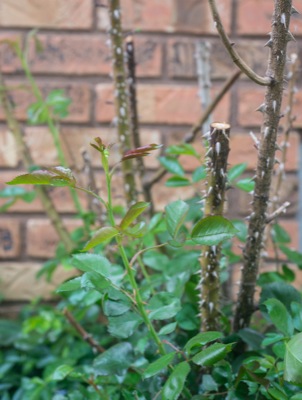Saturday, May 17th, 2014
Harsh winter takes heavy toll on landscapes
Experts say pruning may help rejuvenate bushes
By William Kincaid

Photo by Mark Pummell/The Daily Standard
A new shoot on this rose bush grows next to a couple dead stalks. Local nursery owners said the harsh winter took a toll on bushes and trees of all types, but good pruning may help.
The brutally cold, snow-laden winter inflicted serious damage on plants, shrubs and trees, according to some area nursery and greenhouse employees.
Several floras and trees are struggling to flourish - and likely won't regain normal growth for years, they said. However proper care may spur them out of their climate-induced daze.
Steve Stone, owner of Nature's Green in Celina and Fort Recovery, experienced a lot of sleepless nights contemplating the thousands of dollars worth of plants destroyed by the cold at his greenhouses, as well as the state of the nursery industry throughout the Midwest.
Stone estimates nurseries in Ohio will lose millions of dollars from the devastating winter. Thousands of pots of perennial flowers and ornamental grasses had to be pitched at his business, he said.
"I've been in the green industry since 1988, and I don't ever remember a winter being as bad as this one was," he told the newspaper Friday.
Stone has seen tremendous damage to redbuds, Japanese maples and all varieties of roses, including popular knockout roses, which usually survive the cold.
Certain plants and trees, like the weeping cherry, are still available at his business but in limited quantities. Ornamental grasses are completely unavailable, Stone said.
"There has been a lot of damage to bushes and trees," said Josh Riethman, vice president of Benanzer Nursery in St. Henry. "We're about a month behind on the plant side (growth) of it."
A year of climatic extremes - a hot, dry summer and extremely cold winter - is to blame, Riethman said.
The Celina area documented more than 60 inches of snow this winter, about twice the region's average. Local weather forecaster Dennis Howick also recorded nearly 30 frigid days when the temperature fell to zero or below; the average is four days per winter.
Peach trees were particularly hit hard, according to Pat Frederick, a manager at Dues Nursery in Celina. Some trees and plants are not widely available, he said.
People need to realize the area hasn't had such a potent winter in 25 years, Frederick said.
"We're seeing a lot of winter burn and a lot of plants that were just taken out from the winter (because of) the extreme cold for long, extended periods of time," he said.
Greg Kittle, lawn and garden department manager at Walmart in Celina, also acknowledged the impact of a harsh winter on the store's stock of plants. He said many died during the last cold front.
Customers seeking to replace flowers and grass has resulted in a 56 percent increase in sales compared to the same time last year, Kittle said.
"It's a lot of your bulbs, your bushes; the grass is really a big thing right now because there's a lot of dead spots in the grass from the hard winter," he said. "We can't keep enough weed (killer) and grass on the shelves because we're selling out quick."
Affected trees and shrubs can be drawn out of their funk through adequate pruning, area landscapers said.
"They will rejuvenate, but it's going to take two or three years for that shrub to look like it did before the winter," Riethman said.
Frederick recommends pruning the dead area of plants and shrubs, cutting all the way back to the green, healthy sections. What would have been a 3-foot tall bush last year may be a foot high this year, he noted.
"The best thing for (owners) to do is cut all the dead bush off, and let it recuperate that way," Frederick said.
Nature's Green guarantees all of its plants for a year and is doing everything it can to maintain its good reputation, Stone said.
"So we have a tremendous amount of replacement to do," he said. "Now this year, I'd like to tell the client this was an act of God and so unbelievably extraordinary."
Recent cool rains may be good for the plants, but they're horrible for retail sales, business owners said. Nature's Green - like most garden centers - does as much as 75 percent of its business in April, May and June, Stone said.
Stone is reaching out to state officials and legislators to see if any financial assistance is available to greenhouses and nurseries. It's frustrating because if this kind of devastation struck soybean or corn crops, there would be more talk about help, he said, noting that horticulture doesn't get the same priority as agriculture.
Chris Gibbs, executive director of the Mercer County Farm Service Agency, said the U.S. Department of Agriculture does have a tree assistance program, reauthorized through the 2014 farm bill, for commercial growers.
Those deemed eligible can receive assistance to either rehabilitate or replace affected trees, according to Gibbs.
"It's just really coming to light because of the harsh winter," he said when asked about the extent of the damage locally.





